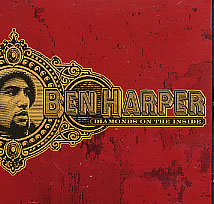| "Diamonds On the Inside" | ||||
|---|---|---|---|---|
 | ||||
| Single by Ben Harper | ||||
| from the album Diamonds On the Inside | ||||
| Released | April 28, 2003 | |||
| Length | 4:26 | |||
| Label | Virgin | |||
| Songwriter(s) | Ben Harper | |||
| Producer(s) | Ben Harper | |||
| Ben Harper singles chronology | ||||
| ||||
"Diamonds On the Inside" is a song by American artist Ben Harper. It was released in April 2003 as the second single from his album, Diamonds On the Inside .